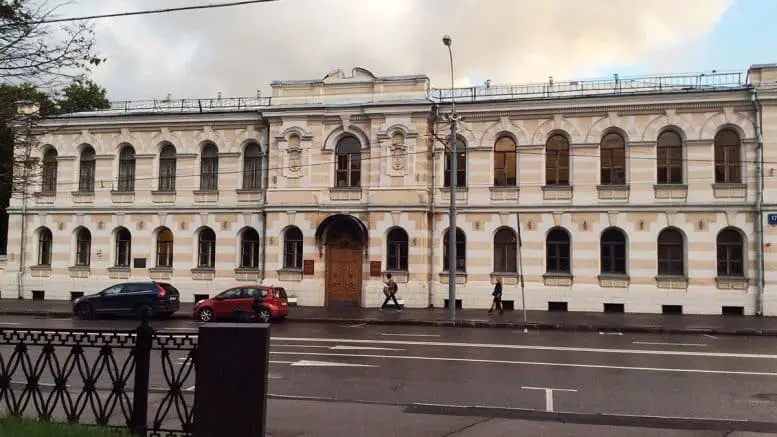The State Archive of the Russian Federation (Государственный архив Российской Федерации) is the legal successor of the Central State Archive of the October Revolution and the Central State Archive of the RSFSR. It is Russia’s largest federal archive and stores about 7 million files covering the history of Russia from XIX-XXI centuries. It remains the state archive, accepting files from Russia’s highest bodies of state power.
Overall Experience
Researchers report that this archive is easy to get into and easy to work with. All information needed to work the archive is freely available and the employees are generally professional and effecient.
Prep Beforehand
GARF’s putivoditel are available at many libraries and are usually for sale rather affordably at the RGASPI bookstore. It is recommend you locate and browse it beforehand.

To order materials from GARF in advance, a scholar should send an email a week prior to his/her arrival, and attach official letter from institution to the email. The email should be as follows:
Здравствуйте, уважаемые специалисты Государственного архива Российской Федерации.
К Вам обращается (NAME, POSITION).
Я провожу исследование (NAME OF RESEARCH, PURPOSE).
В рамках этой работы я планирую приехать в Москву и заниматься исследованием документов в ГАРФ (DATE) этого года.
Прилагаю официальное письмо от моего института.
Обращаюсь с просьбой предоставить к моему приезду (ARRIVAL DATE) и приходу в ГАРФ мне следующие документы:
Р5673 1: Name of file. Date of file
С уважением,
(NAME)
Getting a Propusk
Documents needed: Passport. A letter from the researcher’s institution is desirable, but not obligatory.
Time: 20 minutes to get a day pass, a permanent pass until the end of the year is issued on the next day.
Institution letter template (should be on official letterhead):
(DATE)
Директору Государственного архива Российской Федерации
Ларисе Александровне Роговой
Уважаемая Лариса Александровна,
Прошу Вашего разрешения на ознакомление с материалами архива (RESEARCHER’S NAME, TITLE, POSITION), в рамках темы (ее/его) исследования (RESEARCH NAME, PURPOSE (DISSERTATION, BOOK, ETC)).
С уважением,
(TITLE, NAME, POSITION OF INSTITUTION OFFICIAL)
Working the Archive
Working days between requesting delo and receipt: 3
Maximum delo that can be requested at one time: 10 (with an additional maximum of 750 sheets of management documentation or 250 sheets from personal archives)
Microfilm Copies:
Photos from the microfilm projector may be made, with permission, for free. Paper copies will run from 37-72 rubles per copy, depending on the age and type of material.
Document Copies:
Prices vary according to the age and type of document. Photos may be taken, with permission, for 14-56 rubles each. Photocopies can be ordered for 22-44 rubles each and may take up to a month to process. Scans can run from 44-186 rubles each and generally take less time to process in addition to being of higher quality. Some very old documents may be available for only scans.
Scheduling:
Since reopening after its COVID-closure appointments must be made in advance via the GARF website. Reference numbers of the delo must be given when applying for time slot. The number of slots is extremely limited. One might go to the GARF website for a few days in a row and see no slots, and then, if lucky, get a slot for a date three weeks later.
Notes:
GARF gets busy at times and it is not unusual when very busy for seats to run out quickly. During those times (especially in July), it is best to be there within 5 minutes of its opening. Sometimes it takes over one month to have photocopies prepared, due to high demand. The main GARF building has a stolovaya and cafe on site. The “little GARF” location (at Berezhkovka) has a dedicated room for eating lunches you bring with you. Speaking on the phone in the reading room is strictly prohibited.
What’s it like to work in Russia’s Archives? What’s it like to work with SRAS’ custom Research Abroad Services? Find out more in the video below.
Logistics
Address: Bolshaya Pirogovskaya street 17 (Frunzenskaya metro station).
Phone: (495) 580-88-61
Website: click here
Working hours: Since reopening, GARF is working in “shifts,” with one in the morning, followed by a “disinfection hour,” followed by a second shift. Time slots are contained within these shifts. Current hours are as follows:
Monday, Wednesday: 11:00 – 14:00 and 15:00-18:00
Tuesday, Thursday, Friday: 10:00 – 13:00 and 14:00-17:00
Friday: 10:00 – 16:00.
Closed on Saturday and Sunday and the last working day of each month (sanitarny den).



